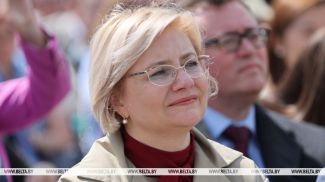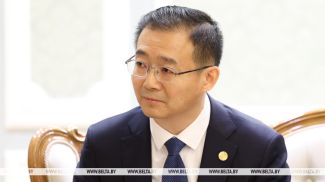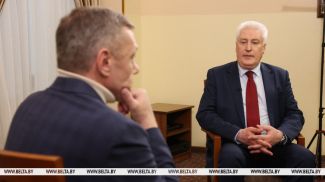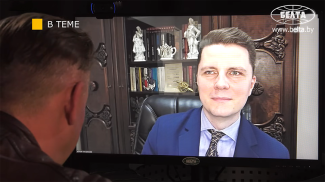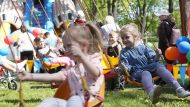
MINSK, 12 July (BelTA) - The economy in Belarus is subordinated to welfare policies, and an individual is the highest value, Deputy Chairman of the Standing Commission on Health, Physical Training, Family and Youth Policy of the House of Representatives, Secretary General of the Belarusian Red Cross Dmitry Shevtsov said at the information and educational event "Minsk - Yesterday, Today, Tomorrow" dedicated to the 30th anniversary of the institution of the presidency in the Republic of Belarus in Minsk on 10 July, BelTA has learned.
Dmitry Shevtsov noted that in the early 1990s, the main goal was to find a job, given the high unemployment rate in the wake of the collapse of the Soviet Union. The mortality rate significantly exceeded the birth rate. Employees received low wages; the size of the pension was very small. With Aleksandr Lukashenko coming to power, a course was taken for social protection of the population, primarily low-income categories of citizens, pensioners.
"The economy is subordinated to welfare policies, and an individual is the highest value in the state. The government offers a large-scale set of measures to support families. These include benefits, housing, guarantees in the fields of education, healthcare, and the family capital program. There is also a possibility to pay for housing and utilities services at reduced rates, to receive targeted social assistance," Dmitry Shevtsov said.
He noted that for 30 years one can clearly see how much the country has transformed, become better, despite the intrigues of European "partners" who have always wanted to make Belarus their vassal state. "Sanctions have made us stronger. The whole world sees that they failed," Dmitry Shevtsov said. "The president was not only able to pull the country from the edge of the abyss but also to shield the nation against serious cataclysms."
As an example, he cited 2020, when they tried to arrange a revolution in Belarus, and the time of Covid lockdowns. "Belarus went its own way and showed by its example that lockdowns is an absolutely absurd way to fight the disease. Even those who fiercely hate our country recognized Belarus’ way to deal with that situation. We did not slow down, we continued to work, branched out into new markets and developed, despite the panic fear of the whole world," Dmitry Shevtsov said.
Visitors to Belarus from other countries also admire the country’s cleanliness, safety, and beauty.
Dmitry Shevtsov noted that in the early 1990s, the main goal was to find a job, given the high unemployment rate in the wake of the collapse of the Soviet Union. The mortality rate significantly exceeded the birth rate. Employees received low wages; the size of the pension was very small. With Aleksandr Lukashenko coming to power, a course was taken for social protection of the population, primarily low-income categories of citizens, pensioners.
"The economy is subordinated to welfare policies, and an individual is the highest value in the state. The government offers a large-scale set of measures to support families. These include benefits, housing, guarantees in the fields of education, healthcare, and the family capital program. There is also a possibility to pay for housing and utilities services at reduced rates, to receive targeted social assistance," Dmitry Shevtsov said.
He noted that for 30 years one can clearly see how much the country has transformed, become better, despite the intrigues of European "partners" who have always wanted to make Belarus their vassal state. "Sanctions have made us stronger. The whole world sees that they failed," Dmitry Shevtsov said. "The president was not only able to pull the country from the edge of the abyss but also to shield the nation against serious cataclysms."
As an example, he cited 2020, when they tried to arrange a revolution in Belarus, and the time of Covid lockdowns. "Belarus went its own way and showed by its example that lockdowns is an absolutely absurd way to fight the disease. Even those who fiercely hate our country recognized Belarus’ way to deal with that situation. We did not slow down, we continued to work, branched out into new markets and developed, despite the panic fear of the whole world," Dmitry Shevtsov said.
Visitors to Belarus from other countries also admire the country’s cleanliness, safety, and beauty.




